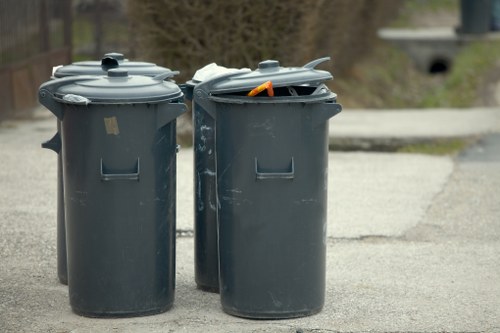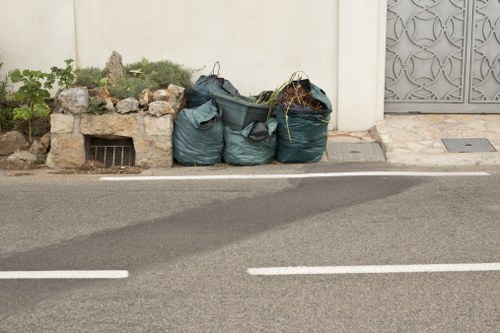Construction Waste Disposal in Pinner

Managing construction waste efficiently is a critical aspect of any building project in Pinner. Proper disposal not only ensures compliance with local regulations but also contributes to environmental sustainability. In this article, we explore the best practices, regulations, and services available for construction waste disposal in Pinner.
Construction activities generate a significant amount of waste, ranging from concrete and wood to metals and plastics. Effective waste management strategies help reduce the environmental impact, lower project costs, and promote a cleaner community.
Understanding the types of construction waste and the appropriate disposal methods is essential for contractors, builders, and homeowners involved in construction projects in Pinner.

Types of Construction Waste
Construction waste can be categorized into several types, each requiring specific disposal methods:
- Concrete and Masonry: These materials are heavy and can be recycled or repurposed for new construction projects.
- Wood: Timber waste can be reused, composted, or processed into wood chips for landscaping purposes.
- Metals: Steel, aluminum, and other metals can be melted down and recycled, reducing the need for new raw materials.
- Plastics: Certain plastics can be recycled, while others may need to be disposed of in designated facilities.
- Drywall: Gypsum from drywall can be recycled or used in the production of new building materials.
Proper segregation of these materials at the construction site facilitates efficient recycling and disposal, minimizing the volume of waste sent to landfills.
Effective waste classification not only aids in environmental conservation but also helps in reducing disposal costs by allowing for the recycling and resale of materials.

Local Regulations and Compliance
Pinner has specific regulations governing construction waste disposal to ensure environmental protection and public health. Contractors must adhere to these guidelines to avoid penalties and contribute to the community's well-being.
Waste Disposal Permits
Obtaining the necessary permits is a crucial step in construction waste management. These permits regulate the types and quantities of waste that can be disposed of, ensuring that disposal facilities are not overwhelmed.
Failure to secure proper permits can result in fines and project delays, highlighting the importance of understanding and complying with local regulations.
Recycling Requirements
Pinner encourages the recycling of construction waste to promote sustainability. Contractors are required to separate recyclable materials from non-recyclable waste and utilize authorized recycling centers.
Implementing recycling practices not only meets regulatory requirements but also enhances the project's environmental credentials.

Waste Management Services in Pinner
Selecting a reliable waste management service is vital for efficient construction waste disposal. Pinner offers several options catering to different project sizes and waste types.
Local Waste Collection Companies
Numerous local companies specialize in construction waste collection and disposal. They provide tailored solutions, including regular pickups and site clean-up services.
- Spacious dumpsters for large-scale projects
- Scheduled waste pickups to maintain site hygiene
- Recycling services for sustainable waste management
Choosing the right service ensures that waste is handled responsibly and complies with local regulations.
Recycling Facilities
Pinner is home to several recycling facilities equipped to process various construction materials. These facilities play a pivotal role in reducing landfill burden and conserving natural resources.
Partnering with these facilities allows contractors to recycle materials like metals, plastics, and wood efficiently.
On-Site Waste Management Solutions
For projects seeking more control over waste disposal, on-site management solutions are available. These include temporary storage units and waste segregation systems to streamline the disposal process.
Implementing on-site solutions can enhance workflow and ensure immediate handling of construction waste.

Best Practices for Construction Waste Disposal
Adopting best practices in waste disposal can significantly impact the efficiency and sustainability of construction projects in Pinner.
Waste Minimization
Reducing the amount of waste generated is the first step towards effective waste management. This can be achieved through meticulous planning, precise material estimation, and efficient construction techniques.
Minimizing waste not only cuts disposal costs but also lessens the environmental footprint of the project.
Material Reuse and Recycling
Reusing materials on-site or recycling them at specialized facilities can divert substantial waste from landfills. Items like bricks, timber, and metals can find new life in other projects or as raw materials for manufacturing.
Encouraging a culture of reuse and recycling fosters sustainability and cost-effectiveness.
Proper Waste Segregation
Segregating waste into distinct categories facilitates easier recycling and disposal. Clear labeling and designated bins for different material types help maintain an organized waste management system.
Effective segregation ensures compliance with recycling protocols and reduces the likelihood of contamination in recyclable materials.
Regular Site Clean-Up
Maintaining a clean construction site aids in efficient waste management. Regular removal of debris and waste prevents accumulation and maintains safety standards.
A well-maintained site also enhances productivity and creates a positive impression for workers and visitors.
Training and Awareness
Educating the construction team about proper waste disposal methods is crucial. Training ensures that all personnel understand their roles in minimizing and managing construction waste.
Awareness initiatives can lead to better compliance and innovative waste reduction strategies.
Benefits of Proper Construction Waste Disposal
Implementing effective waste disposal practices offers numerous advantages for construction projects in Pinner:
- Environmental Protection: Proper disposal reduces pollution and conserves natural resources.
- Cost Savings: Recycling and waste reduction strategies can lower disposal fees and material costs.
- Regulatory Compliance: Adhering to local laws prevents legal issues and project delays.
- Enhanced Reputation: Sustainable practices improve the project's image among stakeholders and the community.
- Resource Efficiency: Optimizing material use minimizes waste and promotes efficient resource management.
These benefits highlight the importance of prioritizing waste management in construction projects.
By embracing responsible disposal practices, contractors contribute to a sustainable future while enhancing their operational efficiency.
Investing in proper waste management is not just a regulatory requirement but a strategic decision that benefits all parties involved.
Choosing the Right Waste Disposal Partner
Selecting a competent waste disposal partner is crucial for the success of construction projects in Pinner. Here are key factors to consider:
Experience and Reliability
Choose companies with a proven track record in construction waste management. Experienced providers are more likely to offer efficient and compliant services.
Range of Services
Ensure the provider offers a comprehensive range of services, including collection, recycling, and disposal, tailored to your project’s needs.
Cost-Effectiveness
Compare pricing structures to find a service that offers value without compromising on quality. Transparent pricing helps in budgeting and avoiding unexpected expenses.
Environmental Commitment
Select partners who prioritize sustainability, utilize eco-friendly practices, and invest in recycling technologies.
Customer Support
Reliable customer support ensures timely assistance and smooth operations throughout the project lifecycle.
By carefully evaluating these factors, you can partner with a waste disposal service that aligns with your project goals and sustainability values.
Building a strong relationship with your waste management partner fosters collaboration and enhances project outcomes.
Innovative Solutions in Waste Disposal
Advancements in technology are transforming construction waste management in Pinner. Innovative solutions are making disposal more efficient and sustainable.
Smart Waste Tracking
Implementing smart tracking systems helps monitor waste generation and disposal in real-time. This data-driven approach enables better decision-making and resource allocation.
Advanced Recycling Technologies
New recycling technologies improve the processing of complex materials, increasing the recovery rate and quality of recycled products.
Green Building Practices
Integrating green building principles minimizes waste production and encourages the use of sustainable materials from the outset.
These innovations are essential in advancing waste management practices and achieving higher sustainability standards in construction.
Embracing technology-driven solutions enhances the efficiency and effectiveness of waste disposal, contributing to smarter and greener construction projects.
Case Studies: Successful Waste Disposal Projects in Pinner
Examining successful projects can provide valuable insights into effective waste disposal strategies.
Project A: Sustainable Office Building
In Project A, the contractor implemented comprehensive recycling programs, resulting in a 40% reduction in landfill waste. Reusable materials and energy-efficient practices were prioritized, setting a benchmark for future projects.
Project B: Residential Development
Project B utilized on-site waste management solutions, including temporary storage and segregation systems. This approach streamlined disposal processes and minimized environmental impact.
Project C: Commercial Complex
Project C partnered with local recycling facilities, ensuring the efficient processing of diverse waste types. The project achieved full compliance with Pinner’s regulations and earned recognition for its sustainable practices.
These case studies demonstrate the effectiveness of strategic waste management in achieving project success and environmental sustainability.
Learning from these examples can guide future projects in implementing best practices for construction waste disposal.
Future Trends in Construction Waste Disposal
The landscape of construction waste management is evolving, with several trends shaping the future in Pinner:
- Increased Automation: Automation in waste sorting and processing enhances efficiency and accuracy.
- Circular Economy: Emphasizing reuse and recycling to create a closed-loop system for materials.
- Regulatory Enhancements: Stricter regulations promoting sustainable waste practices.
- Innovative Materials: Development of eco-friendly materials that generate less waste.
- Community Engagement: Greater involvement of local communities in waste management initiatives.
Staying abreast of these trends allows stakeholders to adapt and implement forward-thinking waste disposal strategies.
The integration of these trends fosters a sustainable and efficient approach to construction waste management in Pinner.
Conclusion
Effective construction waste disposal is paramount for the success and sustainability of building projects in Pinner. By understanding the types of waste, complying with local regulations, and partnering with reliable waste management services, contractors can achieve significant environmental and economic benefits.
Adopting best practices such as waste minimization, recycling, and proper segregation further enhances waste management efforts. Embracing innovative solutions and staying informed about future trends will ensure that construction projects remain efficient and environmentally responsible.
Don’t let construction waste management become a hurdle in your projects. Contact us today to learn how we can assist you in achieving effective and sustainable waste disposal solutions in Pinner.